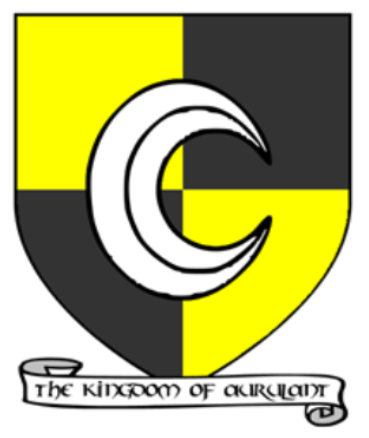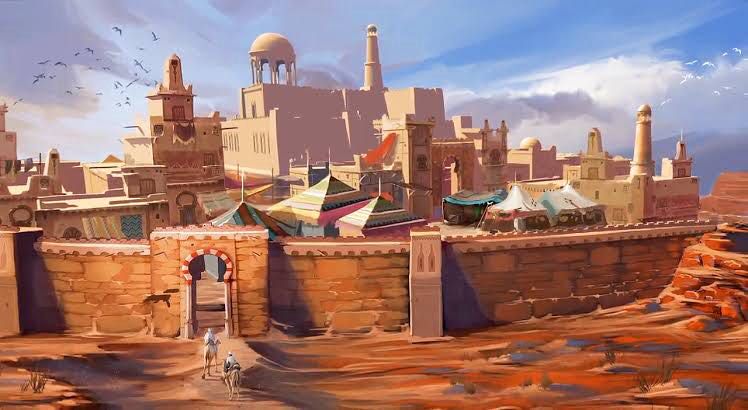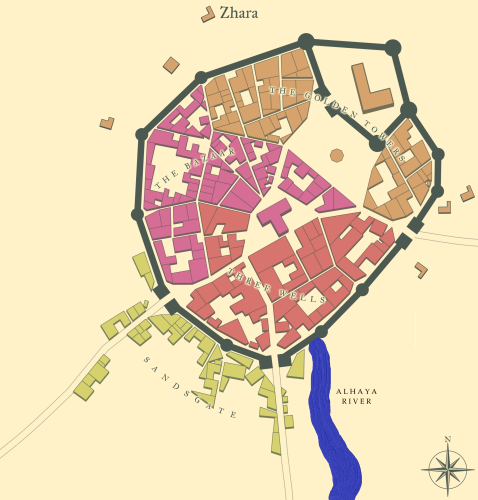Aurulant - The Desert Empire
Located in the southwestern part of the continent, Aurulant is can best be defined by two words – sun and sea. Much of the kingdom is desert or near desert, with savannahs and prairies giving way to dry hilly steppes in the north, dotted with small forests. The eastern edge of this land is the Rampart Mountain Range, a series of tall mountains with highland passes through them. While most of these passes are seasonal, two are always open – the Great Passage, which leads to Veltingard and the Dark Forest, and the Monsters Gate, which leads to southern end of The Desolation. Aurulant boasts the longest coastline of any kingdom, and battles for control of the Bay of Janub on the southeastern coast.
The ruling city of Zhara, an ancient word for wellspring, is built around an oasis in the middle of the Faraz Desert, and is the origin of the Alhaya River, that flows south into the Bay of Janub and into the port city of Marfa. At the southernmost tip of Aurulant are the Pillars of Eamud, tall stacks of sandstone.
In the desert are small villages, called wadi, that are usually centered around rock outcroppings with caves, or wooded oases among the sands.
Structure
Aurulant is always ruled by a female who styles herself Empress. She is also called the Yellow Empress, a traditional title handed down from the founding of the kingdom. The position of Empress is not hereditary; each Empress is chosen by popular vote from among the 14 Golden Houses, noble families that form the upper class of the country. By law and tradition, the Empress takes no spouse nor gives birth to any children. Any children actually born of the Empress are typically raised by the Golden House the Empress was originally from and given a new legal mother.
Each Golden House rules a territory, called an Imperial District. The governors of these Districts are called Satraps. While each Golden House may have their own personal guards, the armed forces of the kingdom are controlled by its Warlord, who sits at the right hand of the Empress. It is often believed that the Warlord is the true power in Aurulant, rather than the Empress, but no one says it aloud - more than once.
Culture
As one might expect from a kingdom that primarily worships a god of rules, Aurulant’s society is highly stratified and structured, with everyone knowing their place in society. Adventurers, who generally break social barriers, give Aurulant's leaders and administrators a headache. While not prohibited or overtly discriminated against, adventurers will often find that the desert kingdom is less welcoming of their talents than some other nations might be.
Aurulanters have a strong tendency towards covering their heads and faces in public, the latter often through the wearing of masks. Many civil ceremonies include masks as official costume or regalia. Fine arts, like drama, poetry, sculpting, dance, and music are well-regarded in Aurulant. In all of these arts, there is a large variety of styles and techniques. Magic in Aurulant is treated like any other art, and is well-regarded rather than feared. Some of the finest practitioners of magic are trained here.
Aurulanters, as one might expect from a desert people, tend to wear light clothing, often made from cotton. Many would have two sets of clothing - daytime clothes, made of cotton, muslin or calico, meant to be worn under the hot sun, and nighttime clothes, which were often made of silk and more brightly colored and patterned, bedizened with trim, jewels or precious metals. Robes are common attire for everyone. Among women, especially women of wealth or nobility, a sari is a frequent nighttime garment.
While marriage is a stylized and ritual ceremony, intimate relationships between people are less rigid. It is not considered shameful for married couples to take lovers outside of their marriage. As children are the property of the mother, no child born into a family is ever illegitimate. Even children of unmarried women are not shunned, but considered "gifts of Azeera". The only bastard children are those that are disinherited by their parents.
History
According to legend, shortly after the Cataclysm, the godling Azeera the Golden guided a ragtag band of survivors south. They passed through lands that had turned from arable fields to fallow sands, becoming the Desert of Faraz. When they could go no further, Azeera brought forth a miracle - three magical springs of water that nurtured the people. The settlement of Zhara sprung up around the springs, and for over a century Azeera protected it.
Over the first few centuries of the Second Age, the kingdom of Aurulant formed from this core group of settlers and the worship of Azeera and Clea. During the Time of 1,000 Gods in the Second Age, the Archmage Mehnaz settled down here, creating one of the first schools of magic. Mehnaz joined with the Yellow Empress Qadhra I to defeat the armies of the Beast Kingdom of Canavar that had formed in the northern desert lands, adding that territory to the Yellow Kingdom.
Mehnaz would later perish in the war against the nascent Elvish kingdom of Avaria which pushed the invading Elves back from the mountain passes between the desert and the woodlands now ruled by Veltingard. The schism within the Elvish race may have halted their ambitions, but Avaria never attempted war against Aurulant again, and itself fell into ruin within seventy years.
Aurulant grew slowly but steadily during the Second Age, ultimately encompassing the lands they now control.
During the first years of the Third Age, Empress Samayiah I declared the Bay of Janub to be the exclusive property of Aurulant. Over the next century, Salthaven privateers fought against the Aurulant navy, and several battles were fought over the Brindini Isles, especially Zorlu. None of these battle were conclusive. While Aurulant still claims sovereignty over the Bay, the reality is that their control remains within sight of their coastline only.
In the Year 270 of the Third Age, missionaries from the northern kingdom of Rosalind began agitating for their goddess Raya, whom they called Raya Invicta. They attempted to preach monotheism to the Aurulanters, which led to arguments and even shouting matches in the streets. After a particularly egregious physical brawl, the Warlord had the missionaries of the Matriarchy expelled from Zhara. Soon after, spies began carrying tales of war preparation in the Kingdom of the Rose.
On the 13th of Stomp, Year 271, the armies of Rosalind began what they termed the Great Crusade, marching into the Cairn Hills and putting several mining settlements to the sword. The general of the Green Legion, which was stationed in the Cairn Hills at the time, made the difficult decision to abandon the steppes to the crusaders and melt into the desert, where they conducted ambushes and nighttime raids. A squad of cavalry riders was dispatched to alert Zhara that Rosalind was invading.
What followed was a long series of engagements to the north of Zhara between the crusaders and the legions of Aurulant. In what would become known as the Field of Bones, three legions (Green, Blue and Orange) fought the invading army to a standstill. Towards the end of that battle, the Rosalinder king was slain and his army fell into disarray before retreating from the field.
Not all of Aurulant's relations resulted in war. When Veltingard was formally founded, the empress of the time sent emissaries to convey congratulations and promises of peace. The desert kingdom supported the nascent kingdoms of Carador and Erynland with money and supplies during their Independence Wars from Rosalind. Despite their animosity, when the Yellow Empress heard of the foul murder of King Bendil by his brother, himself transformed into an undead fiend known as the Wraith King, she sent the famous Unyielding Legion to the borders to harry the armies of the dead and aid the Rosalinders.
Demography and Population
Aurulant is populated mainly by Humans, Goblins and some Salimar, especially on the Alhaya River. Lizardfolk can be found along the waterways and in the port city of Marfa. Dwarves, mainly Himin'Karli, can be found in the marketplaces and craft halls of the Empire. Beastfolk, particularly Lionkin and Gnolls, roam the desert wastes and occasionally will enter a wadi, or village, to trade. Karhu, with their heavy fur, find the heat of Aurulant oppressive, so few of that people willingly live in the desert kingdom. Very few Treefolk venture into the Golden Empire, and those few rarely leave the banks of the Alhaya River, lest they starve from lack of water.
While most Heritages are welcome, Elves may find Aurulant’s hospitality a little chilly, as The Yellow Empire has often warred with the Forest Realm of Veltingard over trade routes.
Territories
Aurulant maintains control over the southwestern quarter of the continent, from the steppes of the Cairn Hills that form the northern border of the Faraz Desert, to the sourthen and western coasts of the continent. Aurulant claims control over the Bay of Janub, although that claim is often disputed by the populace of Salthaven in Veltingard. This includes the three islands in the Bay, collectively known as the Brindini Isles. The largest of these, Zorlu, pays a tithe each years but claims independence from Aurulant, and has been the site of several battles between Aurulanters and Veltingarders over the years.
Military
The Empire is protected by a standing army that is led by the Warlord. The army is divided into five legions of approximately 1,000 soldiers, divided into infantry, light cavalry, and archers/slingers. Every legion has a sorcerer among its command staff. Military service is mandatory for all Aurulanters when they come of age, and is culturally expected. Even Goblins, not exactly known for their fierce courage, join the Legions without hesitation. The only exceptions to conscription are entry into religious duties or pregnancy.
Service in a legion lasts five years, with every legion rotating their duties annually. The legions protect the northern hills, a fort at the Monster Gate, a fort in the Great Passage, the port city of Marfa, and finally rove the country as needed. Once their service is complete, legionnaires are discharged with their weapons and armor, along with their final pay. Officer positions can be bought by the wealthy and leadership of a legion is matter of delicate and often cutthroat politics. Final decisions on officer posts rests with the Warlord. Guarding the capitol city of Zhara is a sixth legion of soldiers that report directly to the Warlord. Clothed in black uniforms and iron masks, they are known as The Unyielding. Every member of the Unyielding is a veteran personally selected for their post by the Warlord. The Unyielding are known for their near silence when they move or attack, most commands being given through hand signs.
Service in a legion lasts five years, with every legion rotating their duties annually. The legions protect the northern hills, a fort at the Monster Gate, a fort in the Great Passage, the port city of Marfa, and finally rove the country as needed. Once their service is complete, legionnaires are discharged with their weapons and armor, along with their final pay. Officer positions can be bought by the wealthy and leadership of a legion is matter of delicate and often cutthroat politics. Final decisions on officer posts rests with the Warlord. Guarding the capitol city of Zhara is a sixth legion of soldiers that report directly to the Warlord. Clothed in black uniforms and iron masks, they are known as The Unyielding. Every member of the Unyielding is a veteran personally selected for their post by the Warlord. The Unyielding are known for their near silence when they move or attack, most commands being given through hand signs.
Religion
The dominant religion is Clea, based on her association with the moon and the night sky. As a desert people, Aurulanters prefer the nights to the days and celebrate the goddess that embodies that. Aurulanters range from the very devout to the noncommittal, but holy days of Clea are universally celebrated in the desert kingdom. It is from their faith in Clea that Aurulanters get their love for rules and structure. Her father Eoa is mentioned in her worship, but not traditionally worshiped on his own, except by small cults preaching his eventual resurrection.
Second to Clea is the minor godling Azeera the Golden, who is worshiped as the founder of Aurulant by leading the people to Zhara and creating the spring from which the Alhaya River flows. Azeera, while considered a separate goddess, is connected to both Clea and Raya, as holy doctrine teaches that Azeera was made, not born. Clea, in order to aid the people, went to Raya while she was sleeping and cut away her intimate parts, fashioned Azeera from them, and sent her to the world to guide and bless the people. This myth serves to explain why Raya, often considered benevolent in other cultures, is considered stern and cruel in Aurulant - she is searching for her lost parts, and scorches the lands of Aurulant as a punishment for her loss. Azeera is believed to have returned to the heavens where the gods live, but will come again when needed by the Desert Kingdom. Azeera is the godling of water, fertility, love, desire, motherhood, springs, and the arts.
Next in importance is Skeinor as the god who gives rain, and mainly revered by farmers and herdsmen as an agricultural deity. Metra the earth goddess is not really worshiped except by small groups of people, typically by farmers, but also by some in the dry prairies in the north. Skeinor's daughter Astoria is respected by soldiers and duelists, who pray to her for victory in battle.
Raya is worshiped, but is considered stern, even cruel, a marked difference from how she is viewed in other lands. People praying to Raya tend to ask that she withhold the heat of her sun.
Korax is hated and his worship considered one of the greatest of crimes. Timmorn the Hunter is known to Aurulanters, but his worship has been outlawed in the cities and wadis of the country. Still, among tribes of beastfolk, one might find either god worshiped by some.
Foreign Relations
Aurulant maintains relations with the other major countries of the continent, although the diplomatic relationships between Rosalind and Aurulant still are a little strained, based on the Rose Kingdom's invasion many centuries before.
Education
Aurulanters are well educated compared to many other nations. Even the poorest family will teach their children their letters, and priests of Clea open the temples as places of learning weekly. As with all things, wealth and status improves access to higher levels and quality of learning.
Regardless of social status, every Aurulanter generally learns some art as part of their curriculum.
Regardless of social status, every Aurulanter generally learns some art as part of their curriculum.

The Desert Kingdom
Founding Date
Second Age
Type
Geopolitical, Empire
Capital
Alternative Names
The Golden Empire
Demonym
Aurulanters, 'lanters (slang)
Leader
Leader Title
Head of State
Government System
Monarchy, Elective
Currency
Kopin
Controlled Territories
Neighboring Nations
Notable Members



Comments